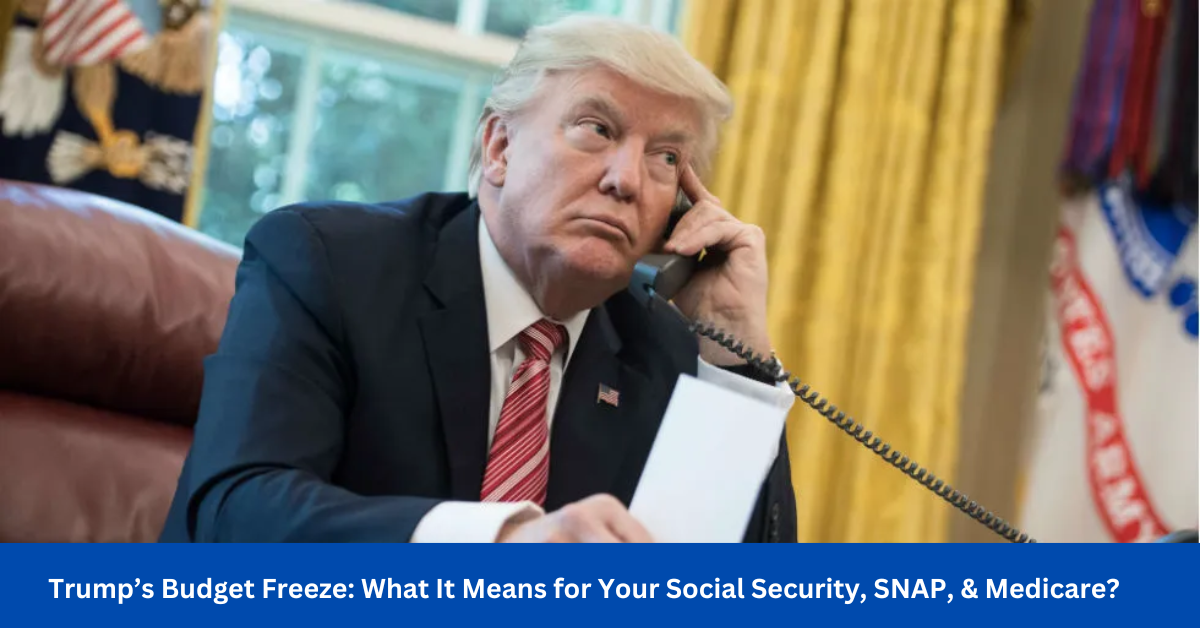President Donald Trump’s recent decision to temporarily freeze certain federal grants and loans has sparked concerns about how it will impact essential programs like Social Security, Medicare, and food assistance. While the move is part of a broader financial review, many Americans are questioning whether their benefits will be delayed. Here’s what we know so far.
What Is Trump’s Federal Funding Freeze?
On Monday night, Matthew Vaeth, acting director of the Office of Management and Budget (OMB), issued a directive instructing all federal agencies to temporarily pause the obligation and disbursement of federal financial assistance. This includes funds related to foreign aid, non-governmental organizations, diversity, equity, and inclusion (DEI) programs, gender initiatives, and the Green New Deal.
Vaeth stated that this freeze will remain in place until a full review of spending is completed. However, no specific timeline has been provided for when this review will be finished or whether additional programs could be affected.
Are Social Security, Medicare, and SNAP Affected?
Immediately after the announcement, many worried that the funding pause could impact Social Security, Medicare, and the Supplemental Nutrition Assistance Program (SNAP), commonly known as food stamps. However, White House officials have clarified that these programs will not be affected by the freeze.
During her first press briefing on Tuesday, White House Press Secretary Karoline Leavitt reassured the public:
“To individuals at home who receive direct assistance from the federal government: You will not be impacted by this federal freeze.”
Leavitt further emphasized that this is not a blanket suspension of all federal assistance and that the administration is simply reviewing spending to ensure funds are used appropriately.
What Programs Are Exempt from the Freeze?
According to a later clarification obtained by Politico, several critical programs will continue receiving funding without disruption. These include:
- Social Security payments
- Medicare and Medicaid funding
- SNAP (food stamps) benefits
- Federal student loans and Pell Grants
- Funding for small businesses and farmers
- Head Start programs for early childhood education
- Rental assistance programs
In short, any direct payments or financial aid programs that help individuals, families, or students will continue as usual.
Why Did Trump Issue the Freeze?
The Trump administration has framed the funding pause as a necessary measure to prevent wasteful government spending. By reviewing financial assistance programs, they aim to ensure that taxpayer dollars are being used effectively and not directed toward initiatives they consider unnecessary, such as foreign aid or ideological programs.
However, some critics argue that the freeze could have unintended consequences, especially if it delays funding for essential community services or small businesses.
What Happens Next?
Since there is no set timeline for when the funding freeze will end, agencies and recipients of federal grants remain in limbo. The administration has promised to prioritize transparency and provide further updates as the financial review progresses.
For now, Americans relying on Social Security, Medicare, and SNAP can rest assured that their benefits will continue without disruption. The administration has made it clear that this pause does not extend to vital assistance programs.
However, as the review unfolds, other government-funded programs could still be impacted, so it’s essential to stay informed about future developments.
Final Thoughts
While Trump’s federal funding freeze has raised concerns about potential delays in benefits, the White House has confirmed that Social Security, Medicare, and SNAP will not be affected. The freeze is focused on financial oversight and reviewing certain types of funding, not cutting off essential aid to citizens.
For now, recipients of federal assistance can expect their payments to continue as usual. However, as the government evaluates its spending, it remains to be seen whether additional funding programs will come under scrutiny in the future.
Disclaimer: This article has been meticulously fact-checked by our team to ensure accuracy and uphold transparency. We strive to deliver trustworthy and dependable content to our readers.

